Understanding Neurotypicals: A Guide for Autistics – Part 1 (Respect)
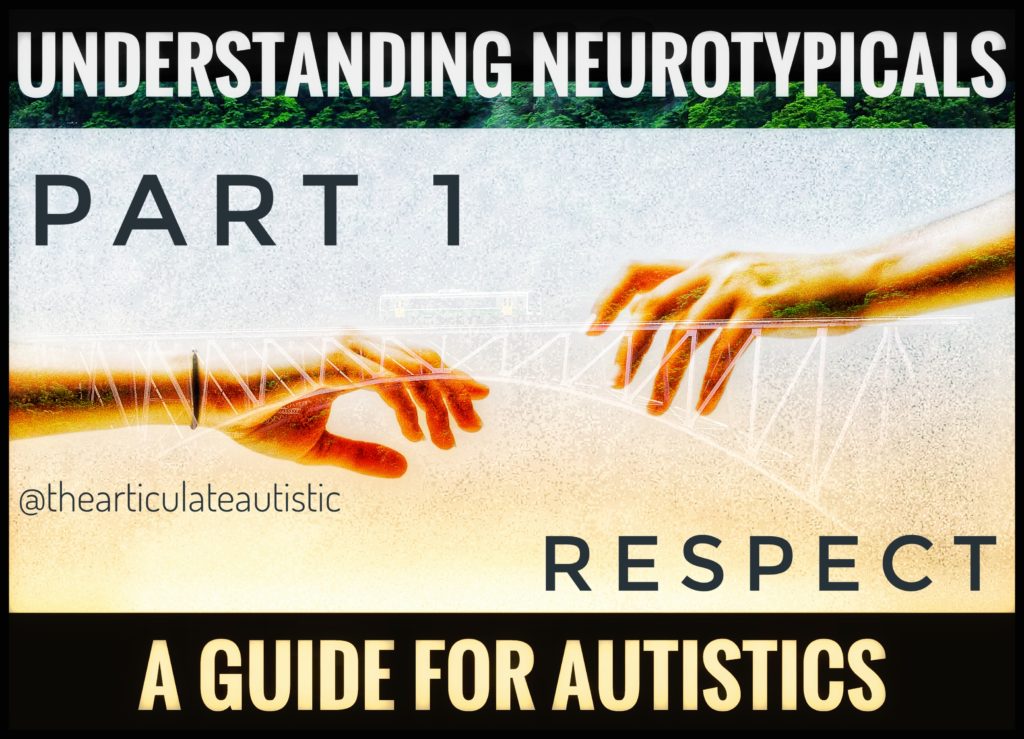
Hello, if you’re new to my website, my name is Jaime A. Heidel, and I’m The Articulate Autistic. I write about living life as a late-diagnosed autistic woman. My main goal is to help neurotypical people understand autistic behaviors, intentions, and motivations so they can communicate more effectively with their autistic loved ones.
I hardly ever write for other autistic people as I’m so focused on making sure we are understood by neurotypicals because I don’t want any more of us to be mistreated, left out, misunderstood, and abused due to the way our brains are naturally wired.
Even though I believe the large majority of the neurotypical population doesn’t intend to cause harm to the autistic community, it happens daily because we speak two different neurological languages.
I feel like I’d like to expand my reach and do some backward translating, if you will. For that, I’ve asked a generous group of open-minded neurotypical volunteers who are willing to do the deep dive it takes to understand their own behaviors and motivations (which are usually automatic and not much scrutinized).
In this new series, I will present one facet of behavior or a social rule that autistic people often struggle with when it comes to understanding their neurotypical counterparts, and I will share the answers I received from my neurotypical volunteers.
Welcome!
Respect
So, part 1, respect. The concept of respect is something I have often struggled with. When I was a child, I was told I “had no respect for my elders” and “no respect for authority”, but, try as I might, I couldn’t get anybody to explain to me what that meant.
What is respect? What would it feel like in my body, brain, and heart if I were to feel respect for someone? How would I know when I felt it? What was its purpose?
As I’ve grown older, I have discovered respect in a way that I understand it, and there are people in the world that I do respect, but it’s because I feel that due to who they are, not who society told me they are.
For example, “respecting elders” or “respecting authority” to me means that I’m expected to automatically defer to someone who is older than me or carries some type of status according to the social hierarchy model of neurotypical society.
I don’t do that. Full stop. I never have, and I never will. Someone must earn my respect before they will have it.
Amazingly, to my autistic brain, neurotypical people appear to be hard-wired to respect those they deem in authority. Even if they don’t agree with their position, the way they handle things, or the way they conduct themselves, they seem to feel that they have to have and show some at least a certain degree of respect for them.
The Doctor Example
A good example would be a doctor who is dismissive of his patient. Let’s say a woman comes in complaining of horrible menstrual cramps every month and the doctor tells her it’s normal and to stop making such a big deal about it. Even though that was her very first appointment with that particular doctor, she automatically respects him because of his status and doesn’t think to question him, ask for medical tests, or get a second opinion.
Two years later, after collapsing at work, she sees another doctor who diagnoses her with severe endometriosis. She now has to have risky surgery and is told she is unable to have children because she was not diagnosed sooner.
Now, for myself, I’ve always experienced severe stomach problems. Doctors hated me. I questioned literally EVERYTHING they told me. I did my own research, I brought it in, I made suggestions, I asked for tests, and all of this was when I was in my 20s! Because of my persistence, I was eventually diagnosed with celiac disease.
But I had no idea that it was considered “inappropriate” to question a doctor, so I never did understand why they got upset with me, but they did. Now that I do know, I’m glad I didn’t back when because I may not have gotten diagnosed at all, and, at the ripe old age of 41, I might be looking at a colon cancer diagnosis right now!
What Respect Means to Neurotypicals
I only have a few neurotypical people helping me out right now by answering these questions, so I will preface this by saying, they are not speaking for all neurotypical people, they are simply offering some insight into the neurotypical mind.
I will keep their names anonymous because I don’t want to risk them getting unwanted messages from others who are (understandably) desperate to understand the NT brain.
(If they ever offer their “translation services” in the future, however, I’d be happy to connect you to them.)
Meanwhile, here are some answers to my question:
“What does respect feel like to you in your brain, body, and heart?”
NT (Neurotypical) 1
“It feels secure like there is an element of safety in the interaction. I’m more relaxed. I watch how they behave. I watch how kindly they treat themselves and other people.”
NT 2
“Respect for others is about valuing their right to be different from me, valuing their right to have their own boundaries.
My respect for others is about sharing my boundaries and hearing theirs so that we can be with each other comfortably. This can be acknowledgment of professional boundaries, or simply telling my partner I’m really tired, I need to be alone.
I feel emotional warmth, physically I am relaxed, and I would smile and enjoy eye contact if it occurred. I would be able to listen with focus as my attention was on the person. My body language would indicate an openness, perhaps sharing similar posture.”
NT 3
“Respecting someone feels warm, kind, easy. When I’ve been disrespectful my body gets tense and the fight or flight response is kicked in. I generally respect everyone until they do something that is scary or disrespectful to others. I have worked really hard to not be disrespectful back because that generally isn’t helpful. I don’t think authority figures are deserving of any more respect than anyone else. Respect is something everyone deserves as a living being.”
NT 4
“Do you mean if I think someone respects me how does that feel to me? If so, I would feel it like a swelling in my whole chest physically. In my heart, I suppose I’d feel a warmth towards that person because to me respect is largely reciprocal. In my mind, a calmness and a surety.
I respect others who have knowledge and share it for the purpose of adding value for others, like you do (as opposed to showing it off just so everyone knows you know it). I respect people who care about other people. I respect people who try hard and build their lives and businesses quietly but with determination. I respect people definitely from a personal or professional experience, as firsthand experience like that can be very different from a public persona that person is putting out. I don’t necessarily respect people because others do, although if someone I respected, respected someone else, I would be more likely to respect them too because I would value that person’s view.
If I respect someone I feel appreciation, gratitude towards them, & inspired and often motivated by them. If I am with someone I respect, I would feel grateful for their company, so warm physical feeling in my heart. I also might feel slightly anxious maybe that they would be disappointed in me for some reason, and I would want their respect back, so maybe the physical feeling of butterflies in my stomach.

I think when adults demand respect from children they want your unquestioning faith in them. Which is hard when you know they are wrong. My daughter used to get into trouble for correcting the teacher. NT teachers believe by their position alone they should be respected without question – instead of thinking wow that kid knows so much I’m really pleased they shared that knowledge with me.”
My Thoughts in Conclusion
From what I’ve gathered from these responses, it seems like respect for neurotypical people is a warm feeling of safety and security. They have specific reasons why they respect someone, and that respect motivates and empowers them. To me, this does make sense. It doesn’t, however, answer the question of “blind obedience” or deference to an authority figure one does not know or trust.
We might have to circle back to that.
Has this been helpful to you? Are there any questions you’d like me to pose to our focus group?
Books for Better Understanding the Autistic Brain
(Whether you’re an autistic person who is newly diagnosed, or you have a loved one on the spectrum, the books below can help you better understand the autistic brain.)
Want downloadable, PDF-format copies of these blog posts to print and use with your loved ones or small class? Click here to become a Patreon supporter!




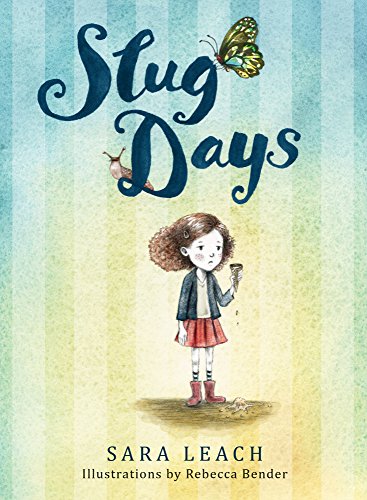
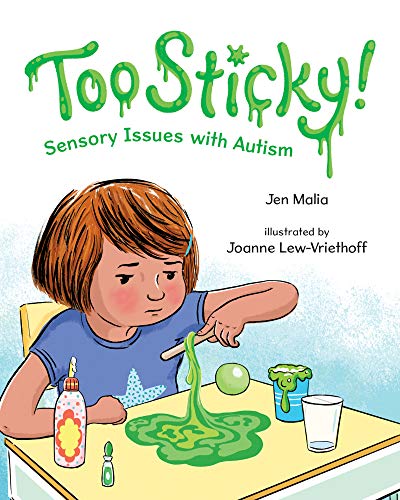
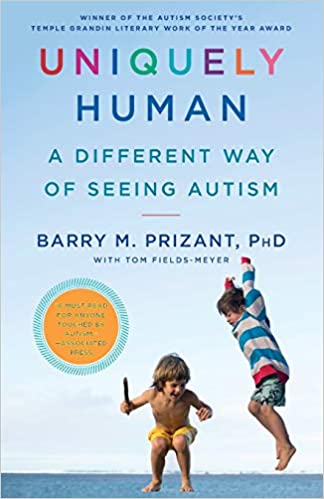
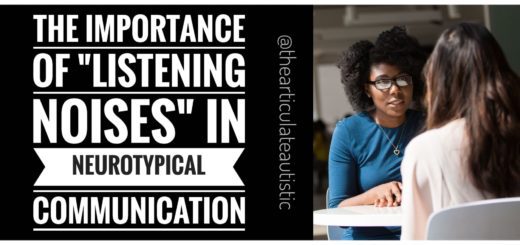



How sure are you that these people are NT? I feel like the type of “NT” who may have come across this page via their autistic child(ren) and is motivated and able to translate their inner experience for autistics may not be so NT after all.
I’m not sure how to answer that question. I can’t verify whether or not they are NT, but they say and behave as though they are. NT people can actually be quite self-aware, it just doesn’t seem as common or a sought-after way of being as it is for NDs?
Thank you for this. I think you and your NT volunteers are using different definitions of respect, both of which are correct in different contexts. Based on what you write, it seems that you understand ‘giving respect’ to a person to mean ‘showing deference, obedience, and submission’ to that person. This is generally the meaning when adults tell children to respect elders or respect authority.
The NT volunteers seem (to me) to be talking about mutual respect between adults, which is a very different thing. In this interpersonal context, ‘giving respect’ means something like ‘recognizing a person’s inherent worth, and treating them as if they have value’. In this context, when you say something like “I don’t respect anyone until they have earned my respect” you may be interpreted as meaning “I view other people as worthless, and treat them like they are worthless, until they have proven their worth to me”.
I don’t think that is what you are trying to say, but I think if you are not very clear that the context is ‘respecting authority’ then NT adults will assume you are using the second definition here, at least most of the time. Thanks again!
Oh, good Lord! I never thought about that. Thank you for pointing it out.
In my experience ppl in “higher positions of social architecture” expect to be treated “better than others incl. myself”. I don’t GET the ‘why’ because it feels like extortion (I owe smth. though I never agreed or had a choice in the matter) so I always chose maximum distance and formality to protect myself. This covers: elders, doctors, bosses, officials.
Do you think that there is also a difference in how to show respect? I respect my friends and my workmates but i behave differently in the pub than i do in a business meeting. Is it hard for my autistic 7y.o. to recognise that respecting a teacher and respecting a parent means behaving in a different way in two different social settings? Maybe the above point is spot on. Showing deference perhaps isnt respect at all but rather a fake version of respect driven more by fear than admiration. Is this perhaps why he struggles in how to manage his tone when speaking to his teacher?
Hi, Hugh. Thank you for your comment and question. Yes, I think you nailed it. Deference is a fake version of respect driven by fear more than admiration. Exactly. I couldn’t have explained that better myself. Anything inauthentic is a struggle for many autistic people. If he truly doesn’t like his teacher or he’s intimidated by him/her, he’s not going to be able to effectively hide that. I would look into why he doesn’t feel comfortable with his teacher, though. There may be some communication disconnect there.
Personally, I respect someone when I sense that they are knowledgeable and carry themselves with dignity and humility.
I don’t respect many people….I’m sure that would shock and even offend many NT people, but it’s true. If I respect you, it’s quite a compliment!
Finding it hard to imagine all the bodily sensations mentioned in interacting with what NT here describe as respect, feels like contrived responses,pride and people not being valued simply as innate worth as human. As NTs do so well in appearing as they “should” respond to look in best light..also find the responses sounding a little patronising for sake of representative answers for a population. Currently living with people who cannot empathise or “respect” my point of view, feelings in regard to independence so they (NTs) turn it back onto them and me saying with obvious offence “sorry you find us so annoying” or in past I’ve been accused of “despising your family” rather than actually them attempting to be having understanding or empathy. This for these NTs would be sinking to my level somehow and feel an innate narcissistic streak in NTs overall. A sense of entitlement to respect yes for social stairs or what they see as “achievement” worthy praise. . This is currently colouring my response as I guess I’m feeling disrespected and invalidated in my position right now. Blindly expected to be grateful and respectful which I act for their sake but feel cognitive dissonance when do not always feel towards those apparently well meaning with status of pride in being benefactors. Yet unable to receive anything as an NT rule this to them would be deference. Overall pride is the greatest sin in some respects it is the core problem with people overall in interacting NTs or ATs ,both
Hi! Thank you for writting this article. Personally, i dont tgibk that they answered the question about what is reapect. I understand the concept of respect, and the woeds and nice and mainstream. I thibk that respect for NT is more linked to a group idea and social complying.
As an autistic person here is my take: Respect for neurotypicals is following proper social conventions. The following situation is where an autistic person (A) unknowingly gets into trouble.
Neurotypical boss (B) hires A as a research scientist to improve and develop new products. A is eager to show that he/she is productive and believes he/she shows high regards to the company by getting to work quickly and sharing his/her great ideas to improve the status of the institution:
B is offended by A’s arrogance and disrespect for the other members of the research team. A is new to the company and hasn’t established his/her credentials to be a leader of the research team. After a couple of weeks, B fires A. A is bewildered because he/she was by far the hardest working researcher.
Yep. Sounds about right!
Maybe there isn’t a blind obedience, which is why it may have been hard to pick up? I don’t naturally see social hierarchy but I have seen the benefits of controlling the chaos that can ensue from a lack of it, so perhaps it’s that concept that NTs find easier to grasp whereas I may have spent years of social analysis to grasp lol. Thanks for your thoughts on this! Really interesting.
Isn’t the bigger question here about the history of respect? A historical feudal system where a small amount of people held the power (kings and landowners) grew to a society where people in power were automatically respected because they could make or break you. Questioning the power structure could lead to your own death so self preservation takes precedence. Society has evolved to a more equal balance of landownership, in the sense that more people own a little plot of land in the form of houses but there are still hierarchical structures that can make or break you – e.g. schools and workplaces. The majority of people prefer not to upset a societal balance by questioning authority because they prefer to avoid confrontation and aren’t very good at self reflection. That could be read as “showing respect” which will appear arbitrary to some people who want to break down respect to its barest bones. As someone else pointed out though, automatically respecting authority isn’t the same as mutual respect.
Society does function best when everyone is respectful of each other. It’s what a lot of autistic people ask for. “Respect my autism even if I don’t respect your NT behaviours” seems to be something I read a lot in comment sections on posts around autism and NT behaviours. NT’s struggle as much as the next person to make sense of social rules because they are complicated. They just don’t question everything as they’re using their brain for other survival issues. That’s what happens as we have become more global and have to interact with more people with different cultures and religions. A short cut to a peaceful coexistence is to respect people. And that means being agreeable, following reasonable expectations of politeness, listening and accepting other people’s boundaries and limitations.
There are also personality types that demand respect automatically. These tend to be authoritarian people and they gravitate to roles that put them in positions of power. I work in childcare and many fathers take a “respect my authority” approach to their kids. Mothers are more empathetic and seek to make their children happy. But I also observe some mothers lack empathy whilst some dads have respect. My observation is that the more negative types of parents are themselves either quite far along the autistic spectrum or have ADHD with a narcissist personality disorder. They just haven’t been formally diagnosed.
Society is a complicated set of social rules, and many things need to be questioned. I myself question a lot of assumptions about authority but I still respect people because I recognise it’s hard for everyone. Self awareness and self reflection are vital to personal growth but not everyone can do it. So we literally have to respect everyone, regardless of their brain patterns, and accept that some people suck at it and don’t have the capacity to accommodate everyone’s individual needs and learning styles.